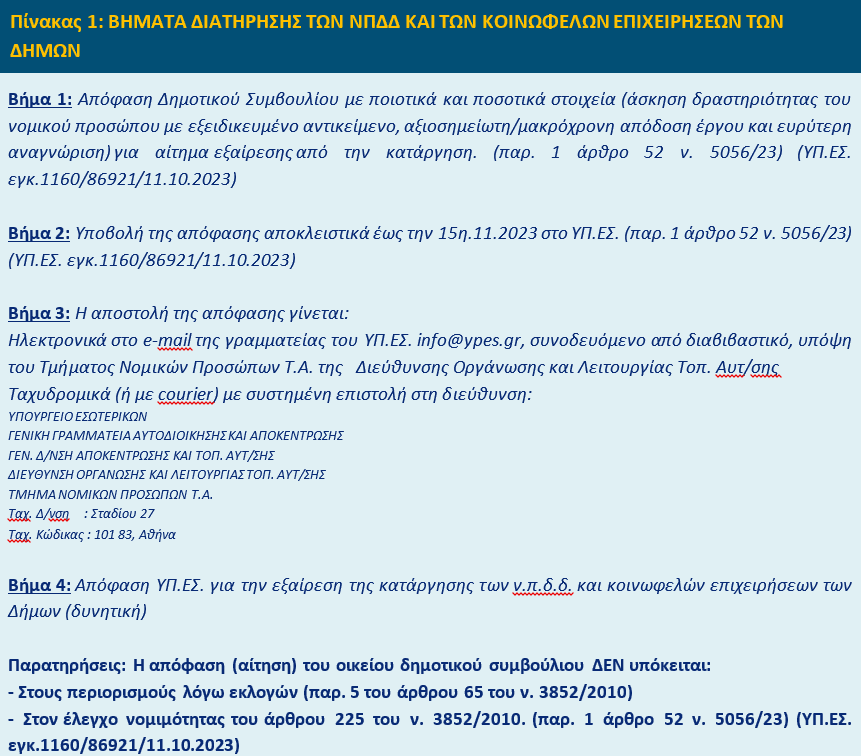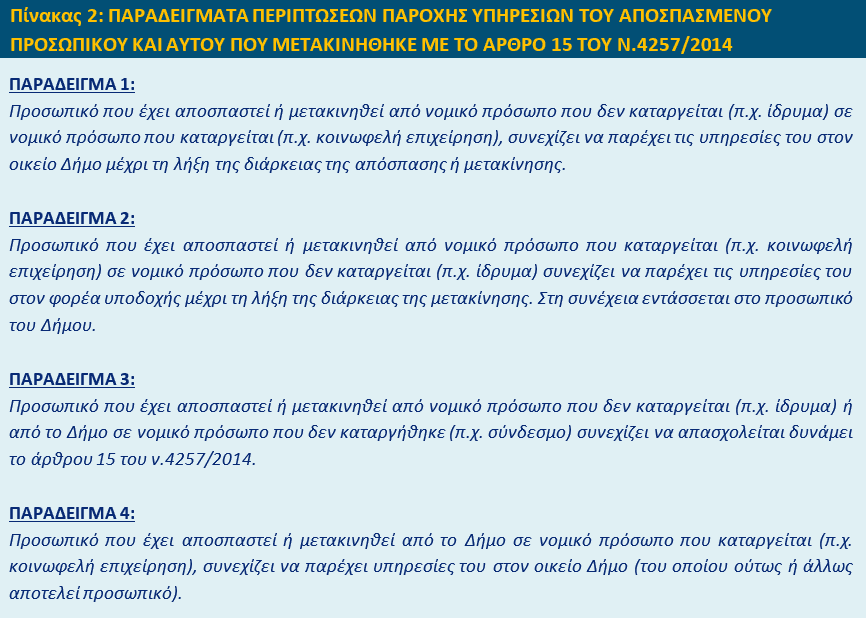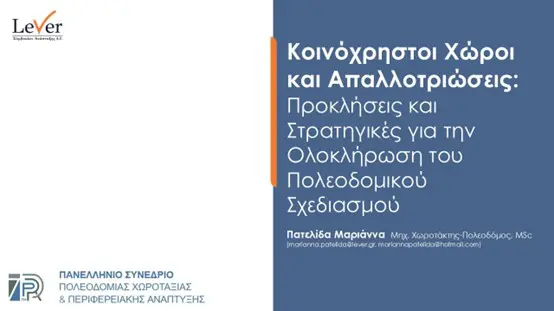Law 5056/2023 concerning the “Abolition of Legal Entities of Public Law and Municipal Public Benefit Enterprises” brings fundamental changes both to the structure and governance of first-level Local Government Organizations. This document attempts to briefly outline these key changes and the manner in which this transition will be conducted. The analysis is structured into three main thematic sections related to the issue. Specifically:
- Abolition of Legal Entities of Public Law & Public Benefit Enterprises
Starting with the entities affected by the legislative changes introduced by Law 5056/2023, these are:
- a) Legal Entities of Public Law established in any manner by first-level Local Government Organizations and operating according to articles 239 to 242 of the Code of Municipalities and Communities \[Law 3463/2006 (A’ 114)], which are to be automatically abolished.
- b) Municipal Public Benefit Enterprises as per section a of paragraph 1 of article 252 of the Code of Municipalities and Communities \[Law 3463/2006 (A’ 114)] and paragraph 1 of article 156 of Law 4600/2019 (A’ 43), which are automatically dissolved, deviating from the usual provisions concerning dissolution or liquidation.
The legally scheduled date for both the abolition and dissolution of the above entities is December 31, 2023, with their responsibilities transferred from January 1, 2024 to the relevant municipality for each entity. The confirmation of abolition or dissolution of each entity is made by an act of the Secretary of the respective Decentralized Administration, published in the Government Gazette within one (1) month from the aforementioned date, i.e., by January 31, 2024. On June 29, 2024, the municipal school committees will be abolished.
The following list includes Legal Entities of Public Law and Public Benefit Enterprises NOT ABOLISHED:
- a) Municipal Water and Sewerage Companies (D.E.Y.A.) (paragraph 1 of article 1 of Law 1069/1980, as replaced by article 1 of Law 4483/17)
- b) Municipal Port Funds (articles 244 of the Code of Municipalities and Communities and 28 of Law 2738/1999)
- c) Municipal Regional Theaters (article 269 KDK), (paragraph 8 of article 10 of Law 4071/2012)
- d) Municipal Foundations (articles 226 onwards KDK)
- e) Associations of Municipalities (articles 245 onwards KDK)
- f) Municipal Anonymous Companies (articles 253 onwards KDK)
- g) Municipal Radio and Television Enterprises (paragraph 4 of article 51 of Law 3905/2010, as amended by paragraph 9 of article 44 of Law 3979/2011)
- h) Municipal Non-Profit Urban Companies (article 267 of Law 3463/06) (paragraph 3 article 107 Law 3852/2010)
- i) Municipal District Heating Enterprises (paragraph 3 article 111 Law 3852/2010)
- j) Inter-municipal Enterprises – Existing anonymous companies of P.D. 410/95 until their expiry (paragraph 9 article 269 Law 3463/06)
- k) Construction Enterprises until their expiry (paragraph 10 article 269 Law 3463/06)
- l) Energy Communities until their expiry (paragraph 1 article 9 Law 4513/18 as amended by article 37 Law 4843/21)
- m) Citizens’ Energy Communities (urban cooperatives of Law 1667/1986) (article 47A paragraph 1 Law 4001/11, as added by article 87 Law 5037/23)
- n) Renewable Energy Communities (urban cooperatives of Law 1667/1986) (article 6B paragraph 1 Law 3468/06, as added by article 46 Law 5037/23)
- o) Local Development Organizations (special purpose anonymous companies) (paragraph 1 article 2 Law 4674/20 as replaced by paragraph 1 article 42 Law 4735/20)
It is worth noting that according to the law (article 52 paragraph 1), exceptions to abolition under articles 27 and 29 of Law 5056/23 may be granted to legal entities whose activity, by virtue of specialized scope, project delivery, and wider recognition, justifies such an exception. This exemption is granted by decision of the Minister of Interior, following an application from the relevant Municipal Council, submitted exclusively by November 15, 2023, accompanied by documented justification with qualitative and quantitative data (e.g., financial statements, personnel tables, etc.). Potential cases for such exceptions might be, for example: a) the Patras Carnival or b) the Philharmonic Society of Corfu, due to their significant economic, social, and cultural importance to their locality.

Furthermore, the law (article 30 paragraph 1) allows the Municipal Council to establish committees to ensure the smooth exercise of the responsibilities of the abolished legal entities. These committees may include non-elected members, with the chair appointed as a municipal councillor or a person of recognized expertise related to the committee’s focus. Additionally, for each abolished legal entity or dissolved public benefit enterprise, the number of deputy mayors foreseen in the relevant municipality can be increased by one (1) if the average budget of the abolished entity over the last five years exceeds 600,000 euros (article 59 paragraph 2 of Law 3852/2010).
- Issues related to Personnel and Amendment of the Internal Service Organization
According to Law 5056/2023, articles 27 paragraph 2 and 29 paragraph 2:
Permanent personnel, personnel with indefinite or fixed-term private law contracts, legal advisors, and salaried lawyers employed by abolished legal entities or dissolved public benefit enterprises automatically become personnel of the municipality, continuing their services under the same employment or contract terms. Service contracts (project-based) continue until their expiration, managed by the municipality.
Regarding personnel classification, permanent staff and staff with indefinite private law contracts are assigned to equivalent permanent or personal positions corresponding to their category and specialty, which are automatically created.
Additionally, permanent positions of abolished legal entities or dissolved enterprises are automatically established for coverage if:
- a) ASEP announcements have been issued
- b) or announcements under Law 2643/1998 regarding employment care for special categories of persons
- c) or approved recruitment planning
- d) or pending transfer procedures (article 27 paragraph 2b Law 5056/2023)
Personnel seconded or transferred under article 15 of Law 4258/2014 to the abolished entities continue to serve the municipality until the end of their secondment or transfer; similarly, those seconded from these entities continue to serve their host entity until the end of their term.
Regarding the Internal Service Organization, municipalities are required by law to amend it within six (6) months of abolition/dissolution, i.e., by June 30, 2024 (this date is indicative). Amendments follow the provisions of the Code of Status of Municipal and Community Employees (Law 3584/2007).
During the transition, until the O.E.Y. is amended, the mayor may decide how the municipality fulfills the purposes of the abolished entity in two ways:
- a) By placing the personnel of the abolished entity into existing municipal units, possibly relocating employees from surplus units to needed ones.
- b) By decision of the Mayor, the organisational units of the abolished legal persons, until the new Internal Service Organization comes into force, are directly under the Mayor or Deputy Mayor appointed by him.
A hybrid model combining the above is also possible depending on municipal needs.
Finally, for municipalities losing legal entities or dissolving public benefit enterprises, the percentage coverage for transfer or secondment to the originating entity is increased from 65% to 80% for municipalities with populations under 90,000 inhabitants.
- Rights and Obligations – Financial Matters
From the abolition or dissolution arise three consequences regarding rights and obligations (articles 27 and 29 of Law 5056/2023):
- Their movable and immovable assets automatically transfer to the municipalities that established them.
- The municipalities succeed universally to all real and contractual rights and obligations.
- Pending lawsuits continue automatically by or against the municipalities without formal notice and without interruption.
The law also establishes a Committee for Recording and Inventory of all assets transferred to the municipality. The committee consists of:
- The Head and one (1) officer of the municipality’s Financial Services
- The deputy mayor of finance or another deputy mayor if the former is not appointed
- One (1) councillor from the majority party
- The outgoing president of the abolished legal entity or dissolved enterprise (if no majority councillor is available)
The Head of Financial Services chairs the committee.
The committee prepares a recording and inventory report, approved by the municipal council, and may be assisted by certified accountants. The committee must complete its work within two (2) months from its formation.

Regarding municipal budgets:
a) If a budget is approved by December 31, 2023: timely preparation and amendment of the budget at the start of the new municipal administration is recommended. Coordination with financial management software teams for integration is essential. Circular ΥΠ.ΕΣ. 1187/88878/16.10.2023 instructs municipalities to notify the Observatory of abolished entities’ names and tax numbers whose income and expenses must be incorporated into the 2024 budget and to update the Interoperability Hub with financial data for 2022 and 2023 by December 31, 2023.
b) If no budget is approved by December 31, 2023, the previous municipal budget remains effective by law until the new one is passed.
In these cases, the proper practice is to carry out timely preparation in the very first days of the new municipal authority taking office by amending the budget. At the same time, it is important to promptly coordinate with those responsible for the financial management software to enable quick integration of data. It should be noted that Ministry of Interior Circular no. 1187/88878/16.10.2023 provided instructions to municipalities, first, to officially notify the Observatory in writing of the names and Tax Identification Numbers (TINs) of the legal entities being abolished as of December 31, 2023, and whose revenues and expenditures must be mandatorily incorporated into their 2024 budget plans, and second, to ensure the complete update of the Interoperability Hub with the financial data of these legal entities for the years 2022 and 2023.
b) When there is no approved and adopted budget by December 31, 2023:
Until the new budget becomes effective—and in any case no later than the end of March of the following financial year—according to Article 160 of the Code of Municipalities and Communities [Law 3463/2006 (A’ 114)], the previous year’s budget remains in effect, by exception to any other general or special provision. According to Article 38 of Law 5056/2023, there is a special legislative provision which allows, during this transitional period, the payment of expenses incurred in exercising the responsibilities of the legal entities that have been dissolved or abolished. Consequently, as clarified by Ministry of Interior Circular no. 1172/87909/12.10.2023, municipalities that do not have an active budget at the beginning of the 2024 fiscal year and are operating under the provisions of Article 160 of the Code of Municipalities and Communities may also carry out and pay for expenses related to the exercise of the responsibilities of the legal entities and public benefit enterprises that are being abolished or dissolved—obviously not beyond the deadline set by these provisions.
Furthermore, Articles 27 paragraph 4 and 29 paragraph 4 of the law specify that the following continue to be implemented by the municipality or through programmatic agreements under paragraph 6 of Article 100 of Law 3852/2010 (agreements with Local Government Development Organizations):
- The responsibilities of the abolished legal entities or dissolved public benefit enterprises
- Funded or co-funded programs, projects, or services by national or European resources or international organizations
- Project contracts
The fixed-term employment contracts of personnel working on the above programs are renewed by the universal successor, in accordance with paragraph 2 of Article 38 of Law 4765/2021 (A’ 28), until the end of the program, project, or fulfillment of the obligation.
Finally, the law addresses, with special provisions (Article 27 paragraph 5 and Article 29 paragraph 5), the continuation of subsidy programs implemented by the Public Employment Service (D.YPA.) for beneficiaries employed or undertaking work preparation in legal entities or municipal public benefit enterprises that are being abolished or dissolved under Law 5056/2023. Specifically, it is permitted to continue all ongoing subsidy programs of the Public Employment Service (D.YPA.) for beneficiaries employed or in work preparation in legal entities established in any manner by first-level Local Government Organizations and operating under Articles 239 to 242 of the Code of Municipalities and Communities [Law 3463/2006 (A’ 114)], or in municipal public benefit enterprises under paragraph (a) of paragraph 1 of Article 252 of the Code of Municipalities and Communities and paragraph 1 of Article 156 of Law 4600/2019 (A’ 43), which are abolished under Law 5056/2023, as well as in any beneficiary municipality that assumes the responsibilities of the abolished entity.







